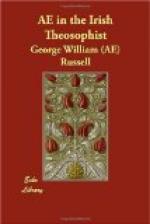—March-April, 1895
Review: “Lyrics” by R.H. Fitzpatrick [London: W. Stewart and Co.]
While one race sinks into night another renews its dawn. The Celtic Twilight is the morning-time and the singing of birds is prophetic of the new day. We have had to welcome of late years one sweet singer after another, and now comes a volume of lyrics which has that transcendental note which is peculiar to our younger writers. It is full of the mystery and commingling of the human and the divine soul:
“Hail, thou living spirit!
Whose
deep organ blown
By lips that more inherit
Than
all music known;
Art is but the echo of thy mysterious tone.”
These lyrics, I imagine, have been wrought in solitary wanderings, in which the forms and shows of things and human hopes and fears have been brooded upon until the intensity of contemplation has allied them with that soul of Nature in which the poet finds the fulfilment of all dreams and ideals. And in this refining back to an Over-Soul there is no suggestion of the student of academic philosophy, no over-wrought intellectualism. Such references arise naturally out of his thought and illuminate it. One can imagine how such lyrics were engendered:
“I stood and twirled a feathered stalk,
Or drank the clover’s honey sap,
Happiest
without talk.
“The summer tidal waves of night
Slowly in silence rippled in:
They steeped the feet of blazing light,
And
hushed day’s harsher din.”
This aloofness from conflict, it if has hindered him from fully accepting and justifying life, the highest wisdom of the poet, has still its compensations. He has felt the manifold meaning of the voices through whose unconsciousness Nature speaks, the songs of birds, the aerial romance and intermingling of light and shadow, and has vision of the true proportion of things in that conflict he has turned his back on:
“All
things sip,
And sip at life; but Time for ever drains
The
ever-filing cup in rivalship,
And
wipes the generations from his lip,
While Art looks down from his serene domains.”




